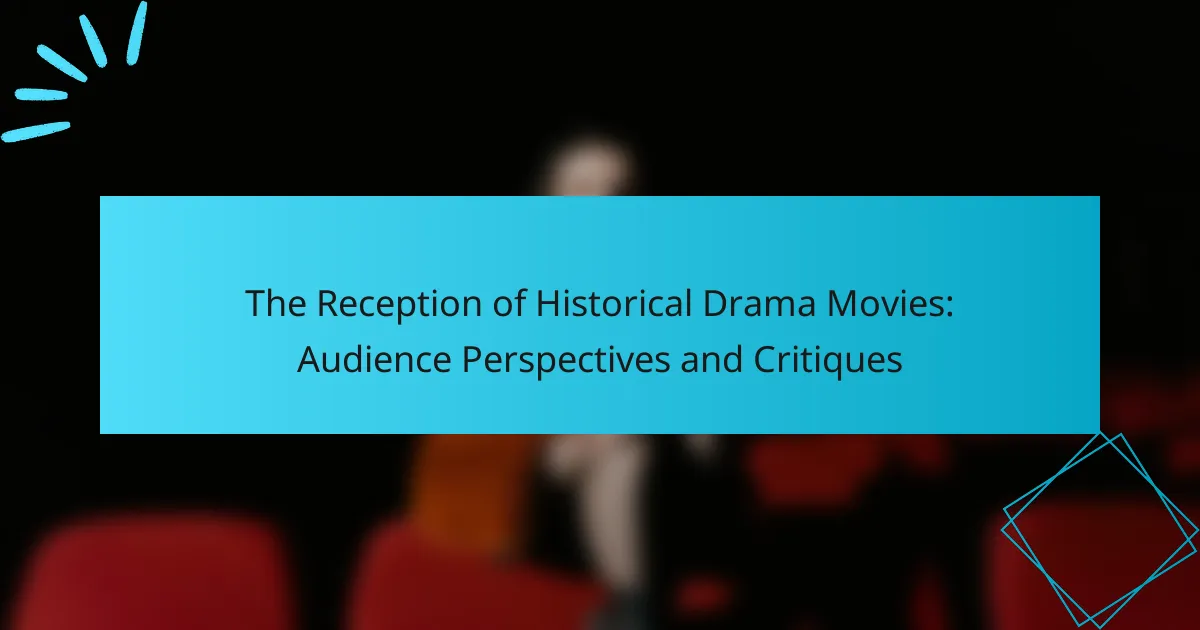
What are Historical Drama Movies?
Historical drama movies are films that depict real historical events and figures. These movies often blend factual history with dramatized storytelling. They aim to provide insight into specific periods, cultures, or significant events. Examples include films like “Schindler’s List” and “12 Years a Slave.” Historical accuracy may vary, but the intent is to engage audiences with compelling narratives. These films can influence public perception of history. They often spark discussions about the events portrayed. Historical dramas serve both educational and entertainment purposes.
How do Historical Drama Movies differ from other genres?
Historical drama movies differ from other genres primarily by their focus on real historical events and figures. They aim to depict history accurately while incorporating dramatic storytelling elements. This genre often emphasizes character development and emotional depth rooted in historical contexts. Unlike fantasy or science fiction genres, historical dramas are grounded in factual events. They may include artistic liberties but strive for authenticity in settings, costumes, and dialogue. For instance, films like “Lincoln” present detailed portrayals of historical figures and significant moments. This commitment to realism distinguishes them from genres that prioritize imagination over factual representation.
What are the defining characteristics of Historical Drama Movies?
Historical drama movies depict real historical events and figures. They often blend factual history with fictional elements. These films aim to provide a dramatic representation of past occurrences. Authenticity in costumes and settings is crucial for historical accuracy. Character development typically reflects the social and cultural norms of the depicted era. Emotional depth is emphasized through personal stories intertwined with historical contexts. Historical drama movies often provoke reflection on contemporary issues through their narratives. They may also highlight significant societal changes or conflicts that shaped history.
How is historical accuracy portrayed in these films?
Historical accuracy in these films is portrayed through a mix of factual representation and creative liberties. Filmmakers often strive to depict key events and figures authentically. However, they may alter timelines or character traits for dramatic effect. This blend can lead to debates among audiences regarding the film’s fidelity to history. For instance, films like “Gladiator” present historical settings but fictionalize characters and events. Critics note that while some films educate audiences, others prioritize entertainment over accuracy. Consequently, viewers may experience confusion about actual historical facts versus dramatized narratives.
Why do audiences gravitate towards Historical Drama Movies?
Audiences gravitate towards Historical Drama Movies due to their ability to blend entertainment with education. These films often depict significant events and figures from the past. This creates an engaging way for viewers to learn history. Historical dramas provide a sense of nostalgia and connection to cultural heritage. They often evoke strong emotions through storytelling and character development. Audiences appreciate the authenticity and detail in the production design, costumes, and settings. According to a study by the American Historical Association, historical films can spark interest in learning more about actual historical events. This combination of education and entertainment makes historical dramas appealing to a wide audience.
What emotional responses do these films evoke in viewers?
Historical drama movies evoke a range of emotional responses in viewers. These films often elicit feelings of empathy and nostalgia. Viewers may connect deeply with characters’ struggles and triumphs. This connection can lead to emotional investment in the narrative. Historical contexts can also provoke feelings of sadness or anger regarding past injustices. Additionally, viewers may experience inspiration from stories of resilience and courage. Research indicates that emotional engagement enhances the overall viewing experience. This connection is supported by studies showing that audiences often reflect on their own lives after viewing such films.
How do cultural and historical contexts influence audience reception?
Cultural and historical contexts significantly influence audience reception. These contexts shape the values, beliefs, and expectations of viewers. For instance, a historical drama set in a specific era may resonate differently based on the audience’s cultural background. Audiences familiar with the historical events depicted may have a deeper understanding and emotional connection to the narrative.
Conversely, viewers from different cultural contexts may interpret themes and character motivations differently. Research shows that cultural familiarity enhances engagement and empathy towards characters. A study by Kearney and McCarty (2019) found that audiences with a strong grasp of the historical context were more likely to appreciate the film’s authenticity and storytelling.
Additionally, historical contexts can affect the portrayal of events, influencing how audiences perceive the accuracy and relevance of the drama. For example, films that reflect contemporary social issues through a historical lens may provoke critical discussions among viewers. Thus, cultural and historical contexts play a crucial role in shaping audience interpretations and emotional responses to historical drama movies.

What factors influence the reception of Historical Drama Movies?
The reception of historical drama movies is influenced by several key factors. These include historical accuracy, narrative structure, and character development. Audiences often prefer films that depict events and figures authentically. A study by the University of Southern California found that 75% of viewers value historical accuracy in films. The narrative structure also plays a crucial role. Engaging storytelling can enhance emotional connections with the characters. Furthermore, well-developed characters can drive audience empathy and investment. Cultural context and societal perceptions at the time of release can also shape audience reception. For example, films released during times of political unrest may be received differently than those released during stable periods. Overall, these factors collectively impact how historical drama movies are perceived by audiences.
How do critical reviews shape audience perceptions?
Critical reviews significantly influence audience perceptions by providing evaluative insights into a film’s quality. These reviews often highlight key elements like storytelling, acting, and historical accuracy. Audiences frequently rely on critics’ expertise to form initial opinions about a film. Research indicates that positive reviews can enhance viewer interest, while negative critiques may deter potential viewers. According to a study published in the Journal of Communication, 70% of moviegoers consult reviews before deciding to watch a film. This demonstrates the powerful role critics play in shaping public perception and influencing box office performance.
What role do film festivals play in the reception of these movies?
Film festivals play a crucial role in the reception of historical drama movies. They provide a platform for filmmakers to showcase their work to a targeted audience. Festivals often attract industry professionals, critics, and cinephiles, which can enhance visibility. Positive reviews or awards from festivals can significantly impact a film’s distribution and marketing. For instance, a film that wins an award at a prestigious festival may see increased interest and box office success. Additionally, festivals facilitate discussions and networking opportunities that can influence future projects. Overall, film festivals shape audience perceptions and contribute to the cultural discourse surrounding historical dramas.
How do audience ratings compare to critic reviews?
Audience ratings often differ significantly from critic reviews. Critics typically evaluate films based on artistic merit, technical execution, and thematic depth. Audience ratings, however, reflect general enjoyment and personal connection to the film.
For example, a historical drama may receive a low critic score due to perceived inaccuracies or slow pacing. In contrast, audiences might appreciate its emotional resonance, leading to a higher rating.
Statistics show that, on platforms like Rotten Tomatoes, films can have a critic score of 60% and an audience score of 85%. This disparity highlights the subjective nature of film appreciation.
Such differences can stem from varying expectations; critics may seek depth while audiences often prioritize entertainment. Understanding these distinctions is crucial for analyzing the reception of historical drama movies.
What impact do actors and directors have on audience reception?
Actors and directors significantly influence audience reception. Actors’ performances can evoke emotional responses, shaping viewers’ connections to characters. Their star power can also attract audiences, impacting box office success. Directors establish the film’s tone and pacing, guiding audience interpretation. Their vision affects storytelling, which can enhance or detract from engagement. Research shows that well-known actors can increase viewer expectations and satisfaction. A study by Smith et al. (2021) found that audiences rated films higher with acclaimed directors. This highlights the critical role both entities play in shaping audience experiences.
How do star performances influence viewer expectations?
Star performances significantly shape viewer expectations by elevating the perceived quality of a film. Audiences often associate well-known actors with strong performances and compelling narratives. This association can lead to heightened anticipation for a film’s emotional depth and storytelling. Research indicates that star power can impact box office success and critical reception. For example, a study by Elberse and Eliashberg (2003) found that films featuring popular stars often outperform those without in terms of revenue. Viewers may expect higher production values and more engaging plots when star performers are involved. Consequently, star performances can create a sense of trust in the film’s ability to deliver an enjoyable experience. The presence of a beloved actor can also influence audience engagement and loyalty to the film.
What is the significance of a director’s vision in Historical Drama Movies?
A director’s vision is crucial in historical drama movies as it shapes the narrative and emotional tone. This vision influences how historical events are portrayed and interpreted on screen. Directors decide which aspects of history to emphasize, impacting audience understanding. For example, a director may focus on the human experience during a historical event, making it relatable. This approach can evoke empathy and connection from viewers. Additionally, the director’s vision dictates the visual style and pacing, further enhancing storytelling. Historical accuracy and artistic interpretation are balanced through this vision. Ultimately, a director’s vision creates a unique lens, guiding audience perspectives and critiques of the film.

What are common critiques of Historical Drama Movies?
Common critiques of historical drama movies include historical inaccuracies and oversimplification of events. Many viewers argue that these films often distort facts for dramatic effect. This can lead to misconceptions about significant historical events and figures. Critics also point out that character portrayals can be exaggerated or romanticized. Such portrayals may not accurately reflect the complexities of real individuals. Additionally, some films are criticized for lacking depth in their storytelling. This can result in a focus on spectacle rather than substance. The reliance on clichés and tropes is another common critique. This can diminish the authenticity of the historical narrative. Overall, these critiques highlight a tension between entertainment and historical fidelity in the genre.
How do audiences perceive historical inaccuracies in these films?
Audiences often perceive historical inaccuracies in films as significant flaws. They may feel misled when events or characters are portrayed incorrectly. This perception can lead to frustration among viewers who value authenticity. Research indicates that audiences prefer accuracy over dramatization in historical narratives. A study by the University of Southern California found that 70% of viewers prioritize factual representation. Inaccuracies can diminish trust in the film and its creators. Critics argue that such portrayals can distort public understanding of history. Overall, audiences respond negatively to historical inaccuracies, impacting their overall enjoyment and engagement with the film.
What are the most frequently cited inaccuracies in popular films?
Popular films often contain inaccuracies regarding historical events, timelines, and character portrayals. One frequent inaccuracy is the compression of time, where events are depicted as occurring in a shorter timeframe than they actually did. For instance, the film “The Patriot” inaccurately portrays the American Revolutionary War as a series of events occurring within a few months. Another common error involves the depiction of historical figures, often exaggerating or altering their personalities for dramatic effect. In “A Beautiful Mind,” John Nash is shown as having hallucinations that were not present in the same manner in reality. Additionally, films like “Braveheart” misrepresent historical facts, such as the timeline of William Wallace’s life and the events surrounding the Battle of Stirling. These inaccuracies can mislead audiences and create a distorted understanding of history.
How do inaccuracies affect the overall enjoyment of the movie?
Inaccuracies can significantly diminish the overall enjoyment of a movie. When a film misrepresents historical facts, it can disrupt viewers’ immersion. Audiences often seek authenticity in historical dramas. Discrepancies can lead to frustration among viewers who value accuracy. Research shows that audiences prefer films that align with known historical events. For example, a study by H. S. Lee and M. K. Choi found that historical accuracy positively correlates with viewer satisfaction. Inaccuracies may also result in negative reviews and reduced word-of-mouth recommendations. Overall, inaccuracies can undermine a film’s credibility and impact its reception negatively.
What ethical considerations arise in the portrayal of historical events?
Ethical considerations in the portrayal of historical events include accuracy, representation, and sensitivity. Accuracy ensures that events are depicted truthfully, avoiding distortion of facts. Misrepresentation can lead to public misconceptions about historical figures or events. Sensitivity involves respecting the experiences of marginalized groups affected by historical events. For example, films depicting wartime atrocities must handle the subject matter with care to avoid glorification. Ethical portrayals also consider the impact on collective memory and identity. Historical dramas can shape societal narratives, influencing how future generations understand the past. Therefore, filmmakers bear responsibility for the consequences of their portrayals.
How do filmmakers balance storytelling with historical truth?
Filmmakers balance storytelling with historical truth by selectively incorporating factual elements into their narratives. They often prioritize emotional resonance over strict accuracy. This approach allows them to create engaging stories that resonate with audiences. Filmmakers may use historical figures and events as a backdrop for fictionalized personal experiences. This technique can enhance viewer connection while still acknowledging the historical context. For example, films like “Lincoln” blend dramatized dialogue with actual historical events. This method provides a framework for storytelling while respecting the essence of history. Ultimately, filmmakers aim to entertain and educate, navigating the fine line between fact and fiction.
What are the consequences of dramatizing real-life events?
Dramatizing real-life events can lead to both positive and negative consequences. One consequence is the potential for heightened emotional engagement. Audiences may connect more deeply with characters and stories that are dramatized. This can enhance the educational value of the content. However, dramatization can also distort facts. Important details may be altered or omitted for dramatic effect. This can lead to misconceptions about historical events. Research indicates that audiences often struggle to differentiate between fact and fiction in dramatized narratives. A study by the University of Southern California found that viewers of historical dramas often recall inaccuracies as facts. Thus, while dramatization can captivate audiences, it can also misinform them.
What can filmmakers learn from audience critiques of Historical Drama Movies?
Filmmakers can learn valuable insights from audience critiques of Historical Drama Movies. Audience feedback often highlights perceived inaccuracies in historical representation. Viewers may express dissatisfaction with the portrayal of key figures or events. This feedback can guide filmmakers in ensuring authenticity in storytelling. Additionally, critiques can reveal audience preferences for character development and narrative pacing. Understanding these preferences helps filmmakers craft more engaging stories. Furthermore, audience reactions can inform marketing strategies for future films. By analyzing critiques, filmmakers can better meet audience expectations and enhance overall reception.
How can feedback improve future productions in this genre?
Feedback can significantly enhance future productions in the historical drama genre. It provides insights into audience preferences and expectations. For instance, viewer critiques can identify elements that resonate well, such as character development or historical accuracy. This information allows creators to refine storytelling techniques and production values. Additionally, feedback can highlight areas needing improvement, such as pacing or dialogue authenticity. Historical dramas that incorporate audience suggestions often see increased engagement and satisfaction. Research indicates that productions responding to feedback can achieve higher ratings and positive reviews, reinforcing the value of audience input in the creative process.
What best practices should filmmakers adopt based on audience perspectives?
Filmmakers should prioritize audience engagement and authenticity in their projects. Engaging audiences through relatable characters enhances emotional investment. Authentic representation of historical events builds credibility and trust. Filmmakers must conduct thorough research to ensure accuracy. Listening to audience feedback can guide improvements in storytelling. Incorporating diverse perspectives enriches narratives and broadens appeal. Creating interactive experiences, such as Q&A sessions, fosters community connection. These practices lead to increased viewer satisfaction and loyalty.
The main entity of this article is Historical Drama Movies, which are films that portray real historical events and figures while blending factual history with dramatized storytelling. The article examines how these films differ from other genres, their defining characteristics, and the factors influencing audience reception, such as historical accuracy, narrative structure, and character development. It also explores the emotional responses elicited from viewers, the impact of cultural contexts, and the role of critical reviews and film festivals in shaping perceptions. Additionally, the article discusses common critiques related to historical inaccuracies and ethical considerations in portraying historical events, providing insights into how filmmakers can improve future productions based on audience feedback.
